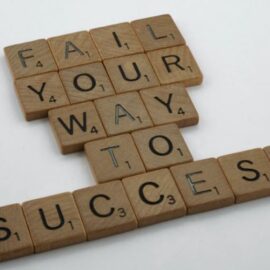

This article is an excerpt from the Shortform book guide to "Ego Is the Enemy" by Ryan Holiday. Shortform has the world's best summaries and analyses of books you should be reading.
Like this article? Sign up for a free trial here .
Why is it important to learn from your mistakes? How does ego prevent you from evaluating your mistakes honestly and dispassionately?
Making mistakes is a part of life and no one is immune to it. What matters is that you don’t miss out on the opportunity to turn your blunders into valuable life lessons and learn from your mistakes.
Read about why it is important to learn from your mistakes, even when they don’t end up tripping you up.
Why You Need to Learn From Your Mistakes
Ego can prevent you from rising above your failures if it stops you from effectively examining what you did wrong. Your ego wants to look only at what you did right, and therefore, makes it hard for you to take an honest look at your own actions and assess your mistakes. However, if you’re unable to examine and learn from your mistakes, you’ll repeat those same errors and won’t be able to emerge from your failures with renewed insight.
You need to examine your mistakes even when they don’t end up tripping you up; sometimes things might work out for you despite the fact that you made poor choices. In these situations, it’s tempting to ignore those poor choices and convince yourself that your success is well-earned, even though in truth you merely got lucky. But when things go well for you despite your mistakes, you need to honestly acknowledge the role luck played in your success, and work to correct your errors so they don’t trip you up next time—because luck will always run out.
An example of correcting mistakes even when those mistakes worked out was the way the New England Patriots responded after they realized they had selected their star quarterback, Tom Brady, almost by accident. They picked Brady in the 6th round and the 199th pick of the draft in 2000, and they didn’t play him until his second season, when he subbed for an injured starting quarterback. He went on to win the team six Super Bowl rings, setting a record.
Despite having successfully picked a legendary player, the team’s management knew that they might have just as easily missed him, and that their success wasn’t because of the wisdom of their choice. Instead of denying their error and letting their ego tell them that somehow they’d had some insight when picking Brady, they acknowledged that their scouting processes had weaknesses. They then set about examining and improving those processes so as to not let this kind of close call happen again.
In this way, the team held themselves to a higher standard than the outcome of their choices. They saw true success as getting the process right, not just the results. People are able to do this when they don’t allow their ego to tell them to be satisfied with the success they currently have, since that success, if not based on solid ground, will prove temporary.

———End of Preview———
Like what you just read? Read the rest of the world's best book summary and analysis of Ryan Holiday's "Ego Is the Enemy" at Shortform .
Here's what you'll find in our full Ego Is the Enemy summary :
- How to resist your emotions so you can keep thinking clearly
- Why your passion may be preventing you from achieving your goals
- How to apply the philosophy of Stoicism for success as a leader






